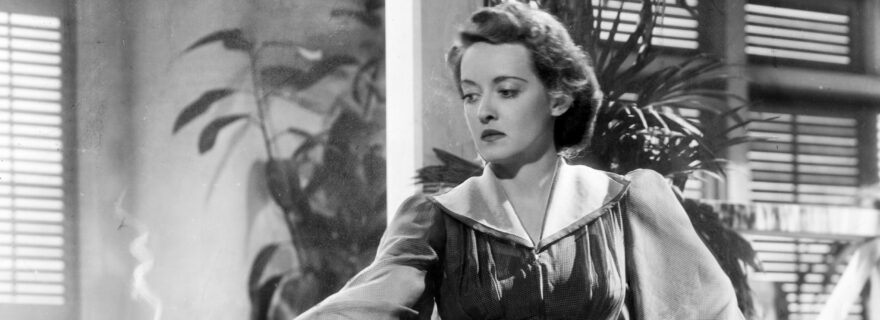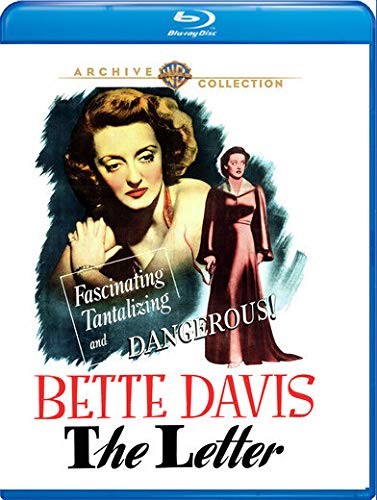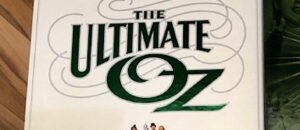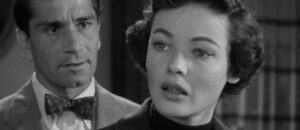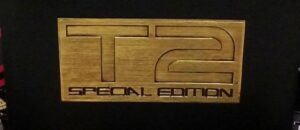A triumph for director William Wyler, The Letter blends drama, intrigue, and impeccable craftsmanship as it chronicles the aftermath of a crime of passion. A bravura Bette Davis performance and excellent support from Herbert Marshall, James Stephenson, and Gale Sondergaard make this sordid tale of deception and betrayal riveting from beginning to end.
The Letter
Theatrical Release Date: November 23, 1940
Blu-ray Release Date: September 24, 2019
Directed by: William Wyler
Starring: Bette Davis, Herbert Marshall, James Stephenson, Gale Sondergaard
Blu-ray Special Features: Alternate ending, vintage radio adaptations, trailer
Over the course of her legendary fifty-year career, Bette Davis worked (and battled) with some of Hollywood’s finest directors, including Joseph Mankiewicz, John Huston, Michael Curtiz, and Frank Capra. Her favorite was undeniably William Wyler. A master craftsman with a firm resolve and iron will, Wyler wouldn’t allow Davis to intimidate or bully him, as she did other directors. Instead, he dominated her, and his penchant for endless takes allowed him to meticulously shape and mold her portrayals. Although few directors could suppress Davis’ trademark mannerisms, Wyler somehow reined her in, and under his tutelage she gave three of her most restrained, dimensional, and magnetic performances. Their first collaboration, Jezebel, earned the actress her second Academy Award, while their last (The Little Foxes) nabbed Davis another Oscar nomination and remains a remarkable tour de force. Though the one in-between, The Letter, may not be as widely known, it stands as arguably their best work together.
Adapted from a not very successful W. Somerset Maugham play, The Letter takes place on a steamy rubber plantation near Singapore. The film opens in dramatic and startling fashion as a gunshot disrupts the calm of a lazy tropical evening. A wounded man stumbles across a bungalow’s veranda, followed by a woman wielding a revolver. She fires again and again and again until she empties all the chambers and the man lies motionless on the ground. Roused by the commotion, a throng of native workers rush to the house, where they find the woman staring blankly at the dead body and still holding the smoking gun.
That woman is Leslie Crosbie (Davis). When her husband Robert (Herbert Marshall) arrives home with their attorney, Howard Joyce (James Stephenson), she confesses that she shot family friend Jeff Hammond after the drunken man dropped in unexpectedly and tried to “make love” to her. Both Robert and Howard believe Leslie’s story and agree she behaved admirably. However, five days before her trial, an incriminating letter surfaces, written by Leslie to Hammond on the night of the murder. In it, Leslie says she’s “desperate,” and demands Hammond visit her that evening in her home. If he refuses, she writes, she “can’t answer to the consequences.”
Hammond’s Eurasian widow (Gale Sondergaard) holds the letter and offers to sell it through an intermediary for $10,000. Howard knows that he must obtain the damning evidence to secure Leslie’s acquittal, even though buying it constitutes a federal offense. Leslie hopes acquiring the letter will not only save her neck, but also preserve her marriage by sparing Robert the devastating knowledge of her adulterous affair.
The dramatic and shockingly violent opening frames of The Letter instantly grab our attention, and thanks to a literate screenplay by Howard Koch (Casablanca) and Wyler’s impeccable shot compositions, the movie never relinquishes it. Although film noir hadn’t yet evolved as a cinematic form, The Letter employs to great effect many of the visual and atmospheric hallmarks that would soon define the genre: deep shadows, stark contrast, and an air of impending doom. The tropical setting and native characters heighten the sense of unease, while Leslie’s duplicitous nature adds complexity to the plot. Wyler also relies on his actors to create and sustain tension, and they comply with understated line readings and subtle bits of stage business that immeasurably enhance their portrayals.
Davis, of course, carries the film as the outwardly prim wife who suppresses her loneliness and frustrated sexual longings by stitching intricate lace patterns that require supreme concentration. Leslie can’t bear to hurt her sweet and generous husband, but can’t stomach deceiving him either, and Davis masterfully depicts her inner turmoil. Marshall built a career playing sympathetic saps, and his anguished performance lends The Letter some much-needed heart. Stephenson supplies the soul as the morally conflicted attorney who abandons his scruples and risks his career to save a woman he no longer respects. Stephenson’s calm intensity seems to soothe Davis, who responds in kind, and the two share some hypnotic scenes. Even without Davis, Stephenson is magnificent and nearly walks off with the picture. Sadly, the actor would die of a heart attack at age 52 the following year, just as he began to achieve the recognition (and leading roles) he deserved.
In a pivotal supporting part, Sondergaard is creepily electrifying as the vengeful wife with “eyes like a cobra” and “a face like a mask.” She only utters a few words (in Malay, no less!), but her piercing gazes speak volumes, conveying heartbreak, anger, and revulsion. Sen Yung (best remembered as “Number Two Son” in more than two dozen Charlie Chan films) also makes an impression as Howard’s oily, unctuous assistant.
Davis vividly recalls in her autobiography The Lonely Life how she bitterly fought with Wyler over her delivery of the film’s climactic line – so much so that she eventually stormed off the set, “something I had never done in my whole career.” She eventually returned and recited the line Wyler’s way, but the standoff shows just how committed both Wyler and Davis were to their respective crafts. Davis’ rare capitulation also reflects her enormous respect for Wyler and implicit trust in his judgment. “I would have jumped into the Hudson River if he had told me to,” she once wrote. Thankfully, he never made such a demand.
The Letter garnered seven Academy Award nominations, including Best Picture, Actress, Director, and Supporting Actor (Stephenson). Whether it’s classified as a precursor to film noir, a murder mystery, or a gritty drama of twisted passions is irrelevant. First and foremost, The Letter is a Wyler/Davis film, and that fact alone makes it required viewing for any movie fan.
The Blu-ray
An atmospheric motion picture like The Letter deserves a top-notch transfer and Warner Archive complies with a beautiful 1080p/AVC MPEG-4 rendering that honors Tony Gaudio’s shadow-rich and Oscar-nominated cinematography. Presented in its original 1.37:1 aspect ratio, The Letter flaunts a natural grain structure that lends the image a marvelous film-like feel. Stunning contrast showcases the brilliant lighting design that often features shafts of moonlight streaming through the open slats of wooden shutters to bisect Davis’ face – a breathtaking effect that emphasizes Leslie’s duplicity. Blacks are lush and solid, whites are bright yet stable, and healthy gray scale adds texture and depth to the picture.
Details like the intricate etchings on the pivotal daggers and Leslie’s delicate lace designs are razor sharp. Although some scenes appear a bit soft and a few shots sport excessive grain, overall clarity is excellent. Gorgeous close-ups of Davis and Sondergaard heighten dramatic impact (few other films highlight those iconic Bette Davis eyes more intensely), and despite all the deep shadows and nocturnal scenes, crush is rarely an issue. Unlike the previous DVD, not a single nick, mark, or scratch mars the pristine source material, allowing the movie’s mesmerizing spell to remain unbroken.
The DTS-HD Master Audio 2.0 mono track is also a nice step up from the 2005 DVD. Sonic details like the drip, drip, drip of rubber from the tropical trees, squeaky doors, and eerie chimes are much more distinct, while superior fidelity and tonal depth add power and resonance to Max Steiner’s haunting, Oscar-nominated score. All the dialogue is easy to comprehend, no distortion is present, and any age-related hiss, pops, or crackle have been meticulously erased.
All the extras from the DVD have been ported over to this Blu-ray release. The most noteworthy is the film’s intriguing alternate ending. Considering all the hoops The Letter jumped through to clear the censors, I hoped the new ending would more closely follow the path of Maugham’s original play, but no such luck. In fact, it strays even further from the original work – and substantially softens dramatic impact – by deleting the climactic confrontation between Leslie and Robert. Still, the ten-minute sequence is a fascinating find and includes a couple of extra snippets that didn’t make the final cut.
In addition to the film’s original theatrical trailer (which features a couple of alternate takes), the disc also includes two radio adaptations of The Letter, both of which star Davis and Marshall, and both of which were produced by Lux Radio Theater. Host Cecil B. DeMille proudly proclaims on the first program (which aired on April 21, 1941) that Davis returned early from an Eastern vacation to participate in the production. The truncated adaptation faithfully follows the film, but Davis’ performance does not. Free from Wyler’s restraint, the actress injects far more histrionics and affectation into her portrayal. On a sad note, the 60-minute broadcast was recorded only three months before James Stephenson, who reprised his role as attorney Howard Joyce, died of a heart attack at age 52. The second program (which aired almost three years later on March 6, 1944) uses the exact same script as the first, and the performances of Davis and Marshall sound practically identical. Vincent Price (in his first Lux Radio Theater appearance) takes over Stephenson’s role and makes it his own.

